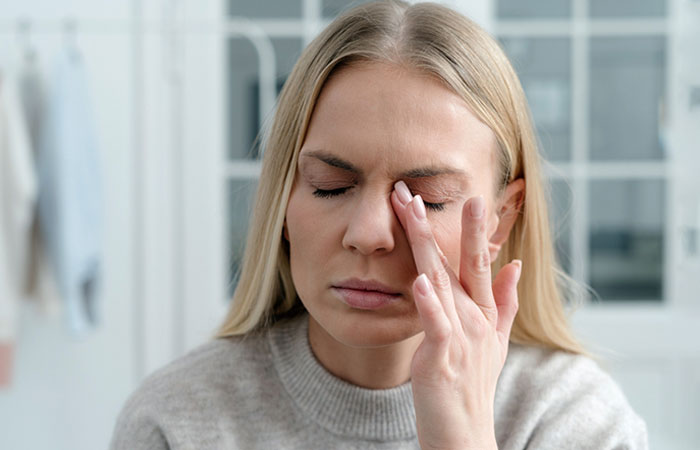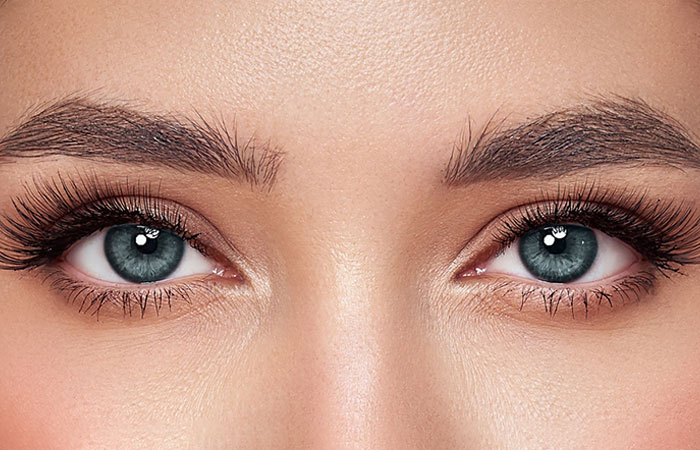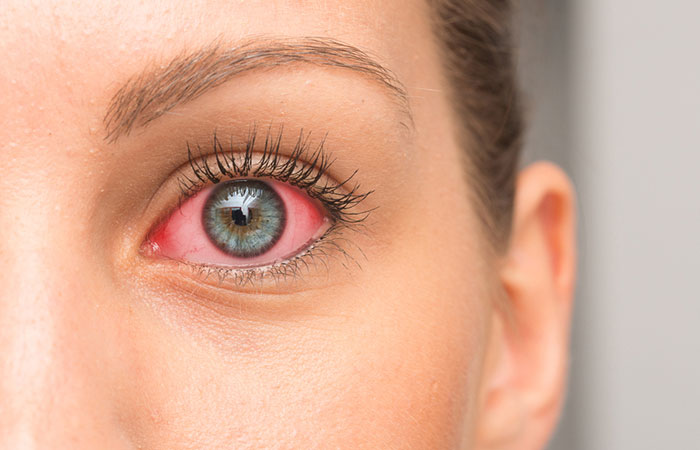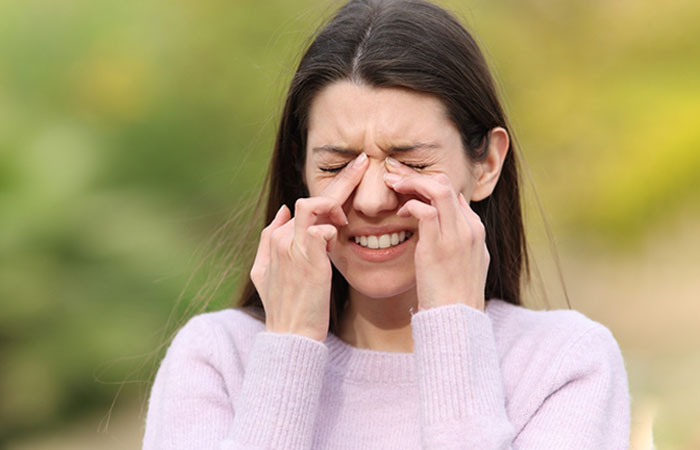Is Castor Oil Safe For Eyes?
Yes. Castor oil can be safe for the eyes if used properly and with necessary safety measures. However, it is essential to use high-quality, cold-pressed castor oil, specifically labeled as ‘safe for ophthalmic use’. Although castor oil has several advantages, it may also cause allergic reactions, irritation, or temporary blurry vision. Therefore, it’s important to ensure that the castor oil you are using is formulated appropriately for your particular condition. Always consult an ophthalmologist before applying it in or around the eyes. Before delving into what castor oil can do for the eyes, it is important to understand what type of castor oil is suitable for the eyes. While castor oil is commonly used in artificial tears solutions and other eye drops, that doesn’t mean you can rub just any store-bought castor oil on your eyes. Scroll down to know in detail about them.
Types Of Castor Oils You Can Use For Eyes
It is important to choose high-quality oil to ensure safety and avail the benefits of castor oil for the eyes. Here are some types of castor oils that are commonly recommended:
Organic Cold-Pressed Castor Oil: It is extracted from castor seeds without using heat, which helps maintain its natural nutrients and purity during the extraction process. Because they do not contain any chemicals, organic castor oils are safe for sensitive areas like the eyes. Cosmetic-Grade Castor Oil: It is a refined and purified form of castor oil that meets specific quality standards for cosmetic use. It is free from impurities and designed for the eyes. Hexane-Free Castor Oil: It is extracted without using hexane (a chemical solvent commonly used in the oil extraction process), making it safer for delicate areas around the eyes.
However, although these oils are safe for topical usage, always do a patch test before applying them. This helps ensure there will not be an adverse response. Also, always read the label to make sure the oil is safe to use near the eyes. Speak with a medical practitioner or an eye expert if you have any questions or concerns about any particular condition. Eye drops containing castor oil are widely used for managing symptoms of various eye conditions, especially dry eyes. Researchers have found it may have several benefits. Let’s understand them in the next section.
Castor Oil Benefits For Eyes
Castor oil has been utilized as a natural remedy for several eye-related treatments and has a number of advantages.
1. May Help Treat Dry Eyes
Nearly 16 million people in the US have dry eyes. Castor oil has the potential to soothe the symptoms of this condition. It has lubricating properties and is widely used in eye drops. It helps create a protective barrier over the eye surface that may relieve the symptoms of dry eye conditions (1), (2), (3). According to one study, castor oil-containing eye drops could increase the lipid layer of the tears, reducing evaporation and keeping eyes moisturized, which helped to relieve dry eyes (4), (5). However, more human studies are needed to understand the safety and efficacy of using castor oil for dry eyes.
2. May Help Improve Dark Circles
Castor oil’s moisturizing properties may even help improve dark circles. There is no strong scientific evidence to support this claim, apart from a single study that found topical castor oil cream to be effective for reducing hyperpigmentation (dark spots) around the eyes (6). However, more clinical trials are required to substantiate this claim. Anecdotal evidence suggests that castor oil keeps the under-eye area moisturized. As a result, it may reduce dryness and help improve blood circulation, which, in turn, reduces the appearance of dark circles.
3. May Boost Eyelash Growth
Castor oil contains around 90% ricinoleic acid (a hydroxylated fatty acid), which has also been demonstrated to have some positive effects on hair growth (7), (8). It’s been used for ages to thicken eyelashes and boost eyelash hair growth. However, no concrete evidence demonstrates the efficacy of castor oil for eyelashes or explains the mechanism. Anecdotal evidence suggests that the fatty acids in the oil keep the eyelashes moisturized, which helps nourish hair follicles and stimulate hair growth.
4. May Help Treat Meibomian Gland Dysfunction
Meibomian gland dysfunction (MGD) is a common eye condition that causes symptoms, like dry eyes, redness, irritation, discomfort, and blurry vision (9). These glands, found in the eyelids, produce oils to form the tear film on your eyes. A study published in an Ophthalmology journal found that low-concentration homogenized castor oil eye drops may help treat this condition by managing the symptoms (10).
5. May Help Reduce Blepharitis Symptoms
Castor oil has anti-inflammatory properties that help reduce symptoms of Belaphritis, a condition that causes inflammation or swelling of eyelid margins (11). A 2021 study, published in The Ocular Surface Journal, found that applying castor oil twice daily for 4 weeks may help reduce blepharitis symptoms (12). Castor oil has antibacterial properties, which may also help reduce redness and irritation and prevent mild eye infections (13).
6. May Help Reduce Eye Puffiness
Castor oil is often touted as an effective natural remedy for reducing puffiness around the eyes due to its moisturizing and anti-inflammatory properties. It has ricinoleic acid, which has anti-inflammatory effects. Anecdotal evidence suggests that massaging the area with the oil may help reduce swelling, promote blood circulation in the area around the eyes, and reduce puffiness.
7. May Reduce Wrinkles
Using castor oil on the face may help reduce the appearance of wrinkles, especially those under the eyes. Castor oil is rich in fatty acids and exhibits emollient properties, which may help hydrate the skin and reduce the look of wrinkles under the eyes and Crow’s feet (14), (6). The fatty acid in the castor oil may penetrate the skin and moisturize it from deep within, which may help reduce the appearance of fine lines. Apart from these benefits, castor oil is also said to be beneficial for cataracts. Anecdotal evidence claims that it might even dissolve cataracts. However, there is no scientific evidence to prove these claims. Remember that cataracts require medical intervention, such as surgery, and using castor oil as eye drops may worsen your condition. Therefore, always consult an eye care professional for treating cataracts and avoid using castor oil without consulting a doctor. If you want to give it a try for general eye care, you may follow the tips suggested in the next section.
How To Use Castor Oil For Eyes
Here are some tips to follow while using castor oil for eyes:
Choose high-quality, cold-pressed, and hexane-free castor oil, and make sure it is labeled ‘safe for the eyes’. For dry eyes, you may use an eye drop containing castor oil. Put one drop of it into each eye with a sterile dropper. Apply a small amount of cold-pressed castor oil to the area around the eyes. Gently dab the area with your fingers and pay attention to the regions with puffiness or dark circles. Apply a thin layer of organic, cold-pressed castor oil around the eyes, focusing on areas with wrinkles. Leave it on for a few minutes or overnight, and wash it off.
You have to use it consistently for several weeks for noticeable results. However, do a patch test before applying it to your skin and always consult an ophthalmologist before using castor oil for eyes. It’s because castor oil has the potential to irritate the eyes and cause other side effects. Learn more about them in the next section.
Side Effects Of Using Castor Oil For Eyes
Using castor oil may cause potential adverse effects, especially if it is not handled correctly or if the oil is not of pharmaceutical grade. Here are some side effects of castor oil for eyes:
Castor oil eye drops may cause irritation and discomfort, as the oil contains ricinoleic acid, which may trigger hypersensitivity when used in the long term (15). Using non-sterile castor oil for eyes may lead to allergic reactions like swelling or rashes and an increased risk of infection. Anecdotal evidence suggests that the oil may clog tear ducts, leading to excessive tearing or dry eyes. Application of castor oil may cause temporary blurred vision, which usually resolves on its own after some time.
A blogger with dry eye condition shares her experience of using castor oil on her eyes in her blog post. She says, “My routine has been; putting a small amount of castor oil on my eyelids before going to sleep. Wiping it off in the morning. Usually by midday and evening, my eyes feel like they are on fire. They can sting terribly, burn, they can be extremely red, and so “exhausted” I can sometimes hardly open my eyes (i).” This highlights the importance of taking necessary precautions to ensure safety and avoid the risk of adverse reactions. Scroll down to know more in detail.
Precautions To Take While Using Castor Oil For Eyes
Here are some key safety measures you must follow:
Always wash your hands and face thoroughly before using castor oil to avoid getting bacteria or other contaminants into your eyes. Do a patch test on a small area of your skin to check for allergic reactions before applying castor oil to your eyes. Remove contact lenses before using castor oil, and then wait at least 15-20 minutes before putting them back in. Start with a small amount of oil and observe how your eyes respond. If there are no negative reactions, you can progressively increase the dosage. Watch for any signs of allergic reactions, redness, or irritation. If you experience any discomfort after using castor oil, then immediately discontinue its use and consult a healthcare professional. Store castor oil in a cool, dark place away from direct sunlight to maintain its effectiveness.
Using castor oil for eyes raises safety concerns, particularly during sensitive times like pregnancy, even after taking the proper precautions. Let’s now find out whether using it during this period is safe or not in the following section.
Is It OK To Use Castor Oil For Eyes During Pregnancy?
While castor oil is generally considered to be safe to use during pregnancy, it is still advisable to proceed with caution and see a doctor before beginning any new treatment. It is also best to avoid consuming castor oil at this time because it has been known to induce labor (16). How long does it take for castor oil to work for dry eyes? The effectiveness of castor oil for dry eyes may vary from person to person. In general, some people may find relief after a few hours of using it, while others may need to use it continuously for a few days or weeks to see a noticeable difference in the symptoms. It is important that you use it as prescribed, which is usually one drop in each eye before bed. Is castor oil like Botox? No. Botox and castor oil are different and castor oil cannot give the same results as Botox. Botox is a neurotoxin injection that temporarily paralyzes muscles to decrease the formation of wrinkles instantly, while castor oil is a natural moisturizer that may help improve skin texture over time. Is castor oil good for eye floaters? There is no solid scientific evidence that supports the effects of castor oil on eye floaters. Consult an eye care expert and undergo an evaluation, as eye floaters are typically caused by changes in the vitreous fluid within the eye. Does applying castor oil under the eyes cause milia? Yes, applying a heavy oil, such as castor oil, under the eyes might cause milia. It’s mainly because the oil might trap dirt and dead skin cells and clog the pores. Therefore, it’s important to clean your skin properly to remove oil residue and use such occlusive oils sparingly. Does castor oil improve eyesight? No. There is no scientific evidence that supports the claim that castor oil can help with eyesight. Although castor oil is often used in eye drops to reduce irritation and dryness, it has no therapeutic benefits for vision-related problems. What happens if castor oil goes into the eyes? If castor oil gets into the eyes, it may temporarily blur your vision and cause a greasy sensation. It may even trigger an allergic reaction and irritate your eyes. If castor oil gets into your eyes accidentally, wash your eyes with warm water immediately. This should provide relief. However, consult an eye care specialist immediately if you still experience redness, irritation, and blurred vision. Who should avoid castor oil for the eyes? People with pre-existing eye conditions, individuals with sensitive skin, or those who are allergic to castor oil and its products must avoid using castor oil. Castor oil is said to promote eyelash growth. But how true is that claim? Check out the video below to learn more about its effectiveness as a lash serum and its potential for relieving dry eyes.








